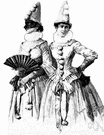masque
(redirected from Masques)Also found in: Thesaurus, Encyclopedia.
masque
also mask (măsk)n.
1. A dramatic entertainment, usually performed by masked players representing mythological or allegorical figures, that was popular in England in the 1500s and early 1600s.
2. A dramatic verse composition written for such an entertainment.
3. See masquerade.
[French; see mask.]
American Heritage® Dictionary of the English Language, Fifth Edition. Copyright © 2016 by Houghton Mifflin Harcourt Publishing Company. Published by Houghton Mifflin Harcourt Publishing Company. All rights reserved.
masque
(mɑːsk) ormask
n
1. (Theatre) a dramatic entertainment of the 16th to 17th centuries in England, consisting of pantomime, dancing, dialogue, and song, often performed at court
2. (Theatre) the words and music written for a masque
3. (Clothing & Fashion) short for masquerade
[C16: variant of mask]
Collins English Dictionary – Complete and Unabridged, 12th Edition 2014 © HarperCollins Publishers 1991, 1994, 1998, 2000, 2003, 2006, 2007, 2009, 2011, 2014
masque
or mask
(mæsk, mɑsk)n.
1. an elaborate court entertainment in England in the 16th and 17th centuries combining pantomime, dialogue, music, singing, dancing, and mechanical effects.
2. a dramatic composition for such entertainment.
3. masked ball.
[1505–15; < Middle French]
Random House Kernerman Webster's College Dictionary, © 2010 K Dictionaries Ltd. Copyright 2005, 1997, 1991 by Random House, Inc. All rights reserved.
masque
A typical European Renaissance dramatic form, with actors using masks and costumes.
Dictionary of Unfamiliar Words by Diagram Group Copyright © 2008 by Diagram Visual Information Limited
ThesaurusAntonymsRelated WordsSynonymsLegend:
Switch to new thesaurus
| Noun | 1. |  masque - a party of guests wearing costumes and masks masque - a party of guests wearing costumes and masksparty - a group of people gathered together for pleasure; "she joined the party after dinner" |
Based on WordNet 3.0, Farlex clipart collection. © 2003-2012 Princeton University, Farlex Inc.
Translations
Collins Spanish Dictionary - Complete and Unabridged 8th Edition 2005 © William Collins Sons & Co. Ltd. 1971, 1988 © HarperCollins Publishers 1992, 1993, 1996, 1997, 2000, 2003, 2005
masque
n → Maskenspiel nt
Collins German Dictionary – Complete and Unabridged 7th Edition 2005. © William Collins Sons & Co. Ltd. 1980 © HarperCollins Publishers 1991, 1997, 1999, 2004, 2005, 2007